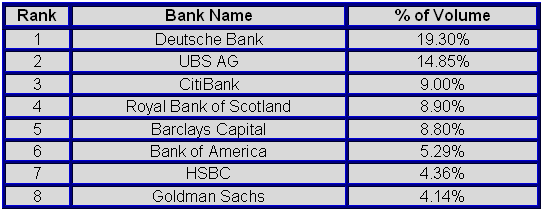Section IV: Main Forex Participants

These days however, the market has changed, with technological development and the ability to conduct transactions overseas with more ease, other financial / non-financial institutions are able to participate in the foreign exchange market, as well as individual investors and traders.
These days speculation accounts for more than 80% of the overall daily activity. These transactions are conducted from commercial banks to individual traders.
The main participants in the Forex market are: banks, central banks, commercial companies, individual investors and traders and brokers and the main reasons they participate in the Forex market are:
- Profit from fluctuations in currency pairs, speculating (close to 80% of the volume)
- Protection from fluctuating currency pairs, derived from trading goods and services, hedging
- Profit from the rollover generated by differences on interest rates
Banks
Banks are the greatest participant of the Forex market. Large transactions are conducted by these banks (billions on a daily basis), both on their customer’s behalf and on their own. Speculative transactions made by banks accounts for around 70% of the volume generated by banks.
Largest Traders in the Spot Market

[Table 5]
Source: Wikipedia
Central banks are mayor players in the Forex market, although the main reason they get in the market is not for speculative reasons. The main goal of central banks is to control the money supply of a nation, so an economy can achieve its economic goals. A central bank could intervene in the Forex market for the following reasons:
- To regain price stability of an exchange rate
- To protect certain levels of price in an exchange rate
- When economic goals need to be achieved (inflation, growth, etc.)
Some central banks are less conservative than others, some of them intervene regularly (like the Japanese Central Bank*) and some of them not very often (Federal Reserve) - at least visually.
The most important central banks are:
The Federal Reserve (US central bank)
The Bank of Japan
The Bank of England
The Bank of Canada
The Swiss National Bank
The European Central Bank
The Reserve Bank of Australia
*The Japanese Central Bank used to intervene a great deal in the past. However, recently there has not been a lot of intervention.
These are corporations that participate in the Forex market trading goods and services abroad. Most companies like to be paid in their home currencies or US dollars, so in order to complete the transactions they need to acquire foreign currency through commercial banks.
Other reason a commercial company may participate in the Forex market is to hedge their exposure. For instance, a company is to receive payments in the future in its home currency. The home currency has been depreciating and it is expected to continue that way until next year. In this case, the company might go short (sell) in its home currency and long (buy) the other currency in the same amount of the payment to be received. This way the price fluctuation will not affect the company.
Investment funds
These are companies represented by pension and mutual funds, international investments and arbitrage funds that invest in other countries securities.
Today, more and more funds are participating in the Forex market to speculate and hedge themselves.
Brokers
Broker companies’ main objective is to bring together buyers and sellers of foreign currency. Most Forex brokers charge no commissions. Brokers get their fee from the spread.
There are two types of brokers:
Money Maker (with dealing desk) – The broker is the counterpart of every transaction made by the trader. When a trader opens a transaction the broker opens the same transaction in the opposite direction, if the trader longs one currency pair, the broker shorts the same currency pair. This is the way for Money Makers to hedge themselves.
Non dealing desk – The broker only connects the trader to banks through an ECN (Electronic Communication Network). No trade is taken by the broker. These are the type of brokers that usually charge a commission plus the spread, but as we said before, transaction costs can fall below what Money Makers charge just for the spread.
Individuals including traders
Individuals that conduct transactions for a wide variety of reasons including: speculating, a tourist wanting foreign currency, etc.

Post a Comment Blogger Facebook